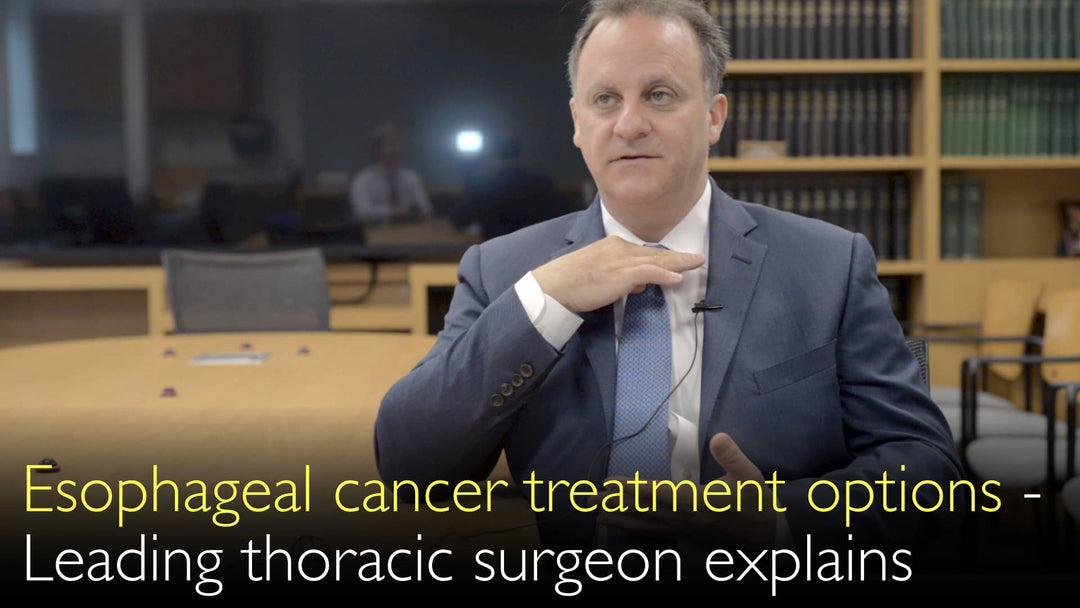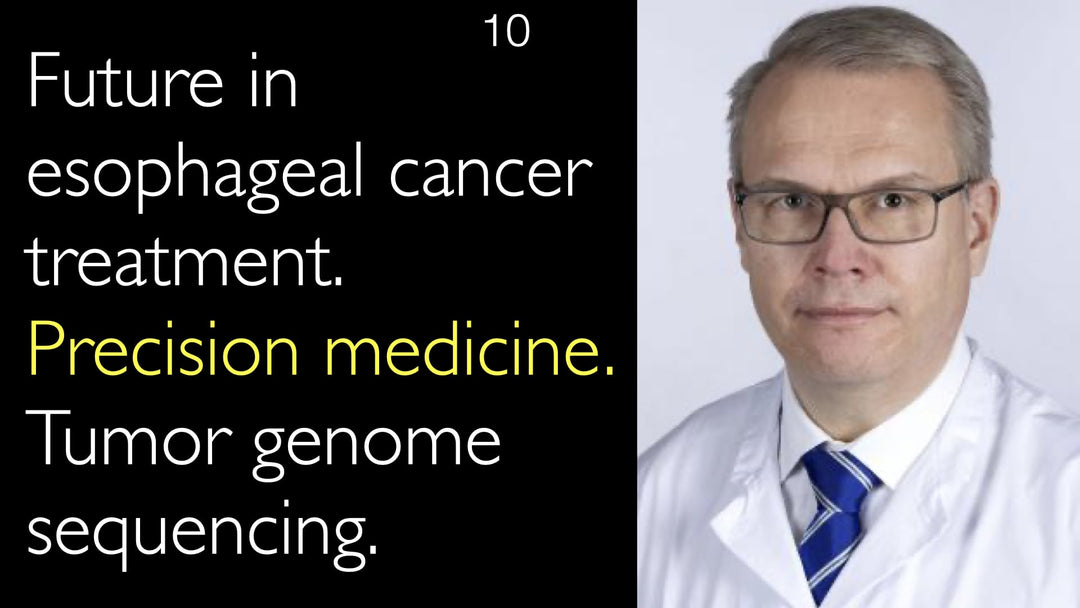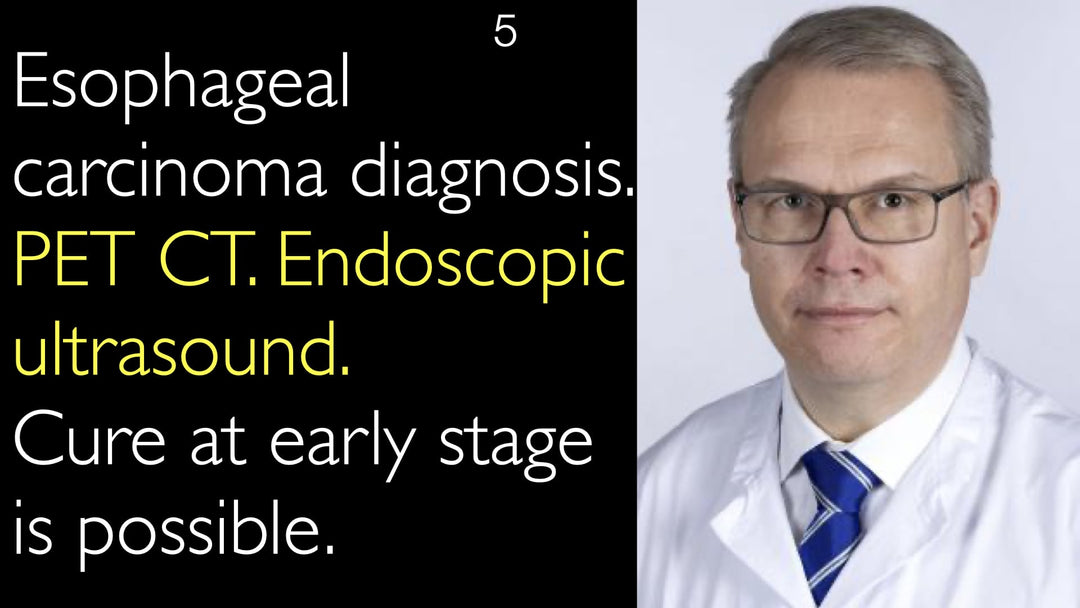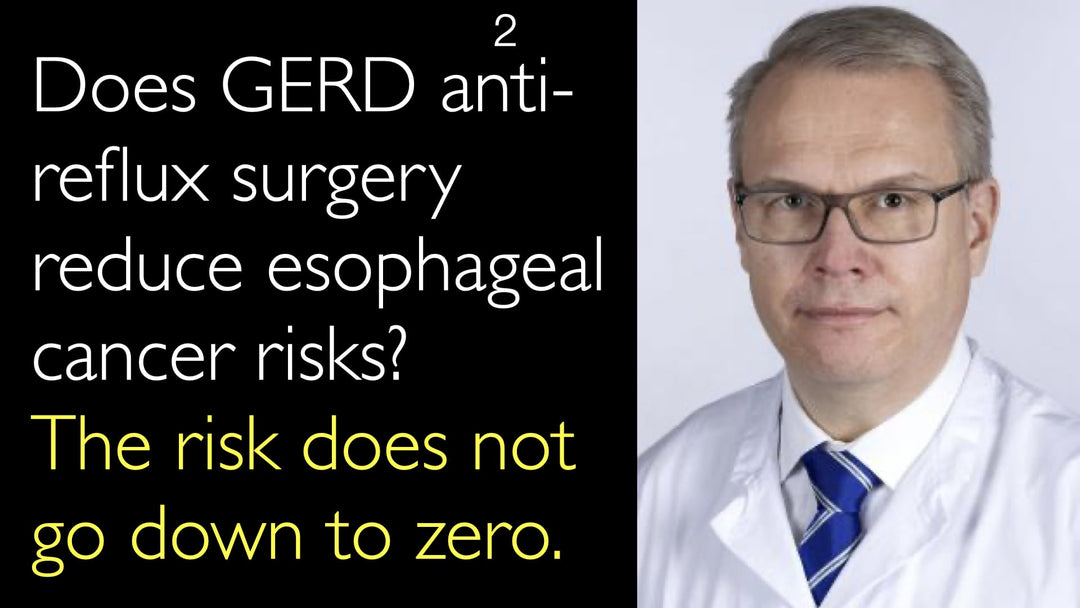O renomado especialista em cirurgia de câncer esofágico, Dr. Michael Lanuti, explica como o tratamento é personalizado conforme o estágio da doença — desde a ablação por radiofrequência para lesões iniciais até uma abordagem multimodal com quimioterapia, radioterapia e cirurgia para casos avançados. Ele detalha o criterioso processo de seleção para pacientes idosos, destacando o papel da tomografia por emissão de pósitrons (PET-CT) e da ultrassonografia endoscópica no estadiamento, e ressalta que até mesmo octogenários podem ser candidatos à esofagectomia minimamente invasiva com intenção curativa, desde que criteriosamente avaliados.
Opções de Tratamento para Câncer de Esôfago: Da Ablação Precoce à Terapia Multimodal Avançada
Ir para a Seção
- Tratamento do Câncer de Esôfago por Estágio
- Ablação por Radiofrequência para Câncer Precoce
- Diagnóstico do Câncer de Esôfago Avançado
- Terapia Multimodal para Câncer Avançado
- Cirurgia para Câncer de Esôfago em Idosos
- Seleção de Pacientes para Tratamento
Tratamento do Câncer de Esôfago por Estágio
O tratamento do câncer de esôfago depende fundamentalmente do estágio da doença no momento do diagnóstico. Segundo o cirurgião torácico Dr. Michael Lanuti, as estratégias terapêuticas variam consideravelmente. No estágio inicial (Estágio 1), procedimentos menos invasivos, como a ablação, costumam ser eficazes. Já nos estágios mais avançados (Estágio 3 e 4), geralmente é necessária uma abordagem mais agressiva, que inclui cirurgia extensa combinada com radioterapia e quimioterapia para obter os melhores resultados.
Ablação por Radiofrequência para Câncer Precoce
Para lesões em estágio muito inicial, restritas ao revestimento do esôfago, as técnicas de ablação oferecem uma alternativa não cirúrgica. O Dr. Michael Lanuti destaca a ablação por radiofrequência, especialmente com tecnologias como a BARRX, como uma opção primária. A crioablação, ou ablação por congelamento, também é um método eficaz para eliminar células cancerosas superficiais. Esses procedimentos são ideais quando o câncer não invadiu a parede esofágica e não há comprometimento dos linfonodos. O Dr. Lanuti observa que esses casos precoces são mais frequentemente detectados em exames de rastreamento, como endoscopias em pacientes com refluxo crônico, e não quando surgem sintomas como dificuldade para engolir.
Diagnóstico do Câncer de Esôfago Avançado
A investigação diagnóstica do câncer de esôfago avançado é minuciosa e precisa. Conforme descrito pelo Dr. Michael Lanuti, o processo padrão começa com uma tomografia computadorizada (TC) do tórax e abdome. A tomografia por emissão de pósitrons (PET-CT) também é essencial para avaliar a atividade metabólica e detectar possíveis metástases. Em seguida, os pacientes realizam uma endoscopia digestiva alta para visualização direta do tumor. Por fim, é feito um ultrassom endoscópico (USE), crucial para determinar a profundidade da invasão tumoral na parede esofágica e avaliar os linfonodos vizinhos, informações vitais para um estadiamento preciso.
Terapia Multimodal para Câncer Avançado
O tratamento do câncer de esôfago localmente avançado exige uma combinação de terapias para maximizar as chances de cura. De acordo com o Dr. Michael Lanuti, a cirurgia isolada geralmente não é suficiente. O padrão de cuidado envolve três modalidades: quimioterapia, radioterapia e cirurgia. A sequência desses tratamentos pode variar entre instituições, mas o objetivo permanece o mesmo. Essa abordagem multimodal e agressiva é necessária para combater a natureza invasiva da doença. O Dr. Anton Titov e o Dr. Lanuti discutem como essa estratégia tem melhorado as taxas de sobrevida.
Cirurgia para Câncer de Esôfago em Idosos
A idade, por si só, não é um impedimento absoluto para a cirurgia curativa do câncer de esôfago. Avanços nas técnicas cirúrgicas, especialmente a esofagectomia minimamente invasiva, reduziram o impacto físico da operação. O Dr. Michael Lanuti confirma que isso ampliou as opções de tratamento, permitindo considerar pacientes com 80 anos ou mais para o procedimento. No entanto, ele ressalta que a decisão nunca se baseia apenas na idade. Uma avaliação criteriosa da saúde geral e da reserva fisiológica do paciente é fundamental para garantir segurança e resultados positivos.
Seleção de Pacientes para Tratamento
A seleção adequada do paciente é a base para o sucesso do tratamento do câncer de esôfago. O Dr. Michael Lanuti enfatiza que esse processo é especialmente crítico para idosos considerando cirurgias de grande porte. A avaliação integra os resultados de todos os exames diagnósticos, incluindo PET-CT e ultrassom endoscópico, para compor um quadro clínico completo. O estado funcional, as comorbidades e a condição geral do paciente são ponderados em relação aos benefícios e riscos do tratamento agressivo. Essa análise holística garante que cada paciente receba um plano personalizado com as melhores chances de sucesso, conforme discutido pelo Dr. Anton Titov.
Transcrição Completa
Tratamento do câncer de esôfago por estágio: a ablação por radiofrequência pode ser usada no Estágio 1. Já os estágios 3 e 4 exigem cirurgia extensa e radioterapia. A quimioterapia também pode influenciar a eficácia do tratamento e o prognóstico.
Dr. Anton Titov, MD: O tratamento do câncer de esôfago é uma de suas especialidades. A cirurgia, quando possível, é um dos padrões-ouro no tratamento. Atualmente, cada vez mais idosos podem ser candidatos à cirurgia. Quais são os critérios para o tratamento cirúrgico do câncer de esôfago?
Dr. Anton Titov, MD: Como os pacientes são selecionados para o tratamento?
Dr. Michael Lanuti, MD: O câncer de esôfago costuma ser bastante agressivo. Hoje dispomos de mais recursos para tratar a doença em estágio inicial, quando o tumor está restrito ao revestimento do esôfago. Nem sempre é necessária uma cirurgia oncológica; técnicas como a ablação da mucosa esofágica são opções.
Há a ablação por radiofrequência, com tecnologia como a BARRX, e a crioablação, ou ablação por congelamento, aplicável no pulmão e no esôfago. A ablação por radiofrequência é indicada para lesões muito precoces, confinadas ao revestimento, sem invasão da parede esofágica ou envolvimento de linfonodos. Esses casos geralmente são detectados em exames de rastreamento, e não quando o paciente já apresenta sintomas.
Isso está correto. O rastreamento é comum em pessoas com refluxo crônico submetidas à endoscopia. Já os tumores mais volumosos costumam causar dificuldade para engolir.
A crioablação não é adequada para câncer avançado. Esses pacientes são investigados com TC de tórax e abdome, além de PET-CT para avaliação metabólica e detecção de metástases.
Os pacientes também realizam endoscopia digestiva alta e ultrassom endoscópico, que determina a profundidade da invasão tumoral.
Dr. Anton Titov, MD: A cirurgia é o pilar do tratamento do câncer de esôfago.
Dr. Michael Lanuti, MD: Mas, sinceramente, a cirurgia sozinha não é curativa. Precisamos usar todas as armas disponíveis: quimioterapia, radioterapia e cirurgia.
A sequência do tratamento varia entre hospitais, mas acreditamos que a combinação dessas três modalidades oferece a melhor chance de cura.
Quanto à idade, hoje realizamos esofagectomia minimamente invasiva, o que permite tratar pacientes mais idosos.
Ainda é uma cirurgia de grande porte, com significativo estresse corporal, mas é possível operar pacientes com 80 anos ou mais.
Dr. Anton Titov, MD: Contudo, a seleção dos pacientes deve ser criteriosa.








